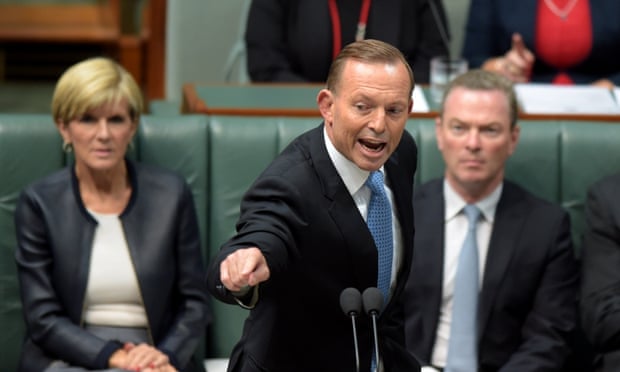
Lenore Taylor, political editor Saturday 14 February 2015
Shutting down those who challenge your ideas leads to bad policies and an erosion of the confidence and trust necessary for lasting political success
The leadership style the prime minister and his inner circle always believed to be an asset has in fact been a fatal flaw. Photograph: Lukas Coch/AAP
Watching an authoritarian leader slowly drained of his authority is fascinating, in a macabre way.
This week’s spasms in Coalition policy and in Tony Abbott’s political personality are the jolting consequences of the real message from Monday’s vote: that the leadership style the prime minister and his inner circle always believed to be an asset has in fact been a fatal flaw.
Columnist Niki Savva told a story this week about Abbott rounding on young backbencher Wyatt Roy last May when he dared to suggest, at a private dinner, that the government’s broken promises were a problem, yelling that there were no “effing” broken promises and no one should ever concede there had ever been.
Last year I reported on a very similar incident at a full ministry meeting, where a junior minister asked how the government was intending to deal with the widespread view that it had broken election promises and was told by the prime minister, also in very angry terms, that there had been none. End of story.
But of course it wasn’t the end of the story for the electorate, it was actually the most important and disturbing plotline of the Coalition’s first year, and eventually the prime minister conceded he had broken promises not to cut the ABC or foreign aid. But he continues to maintain that all the other promises everyone else thinks he has broken – like not to cut health or education or pensions – he in fact hasn’t broken at all.
His ABC concession was partial, reluctant, without any admission of an actual mistake. A consensus-driven leader can grow stronger from a back down by looking like they’ve listened and learned. When an authoritarian leader is grudgingly forced to take a tiny step backwards they just look unsteady on their feet.
Lenore Taylor and Katharine Murphy talk Tony Abbott’s spill week
And when the authoritarian leader sets up new consultation processes with the same backbenchers who have been so comprehensively ignored and shut out by the prime minister and his command and control office, the changes are viewed with suspicion.
Authoritarian leaders ridicule or ostracise stakeholders and lobby groups who disagree with them, rather than listen respectfully to their views. That has been this government’s modus operandi from the outset, which makes it very difficult to rebuild trust now that it is suddenly changing tack and trying to get some of those same groups onside.
The government did not consult doctors about its original $7 co-payment, and the Australian Medical Association president, Brian Owler, has said that at his first post-budget meeting with then health minister, Peter Dutton, the AMA was “essentially given an ultimatum: you can either support this proposal or be on the outside”. The AMA says it was not consulted on the government’s subsequent backflips on the policy either and when it submitted an alternative plan to government it heard nothing, until Dutton emerged at the same time as Owler was announcing the plan publicly to label it a “cash grab”.
But now the prime minister is suddenly saying the doctors have a virtual veto over future policy positions, because the government will not put forward anything they do not support.
The AMA, unsurprisingly, is not that inclined to oblige.
Owler says the AMA is opposed to all the government’s proposed savings and will only consider a co-payment, with exemptions for pensioners and children, if the money raised is invested back into general practice – which would deliver the government no savings to be directed to its proposed medical research fund.
An authoritarian leader’s need to attack, even annihilate, critics can also be devastatingly self-defeating.
Tony Abbott and senior ministers were deeply angry at Barack Obama’s show-stealing climate change speech during the G20, and in true authoritarian style launched an extraordinary onslaught on an ally.
They briefed multiple News Ltd columnists to that effect – including graphic accounts of how they rang up afterwards and yelled at State Department officials for failing to give a “heads up” that the president was going to “dump on” the PM. Julie Bishop said the president clearly hadn’t read a briefing on all the excellent things Australia is doing to protect the Great Barrier Reef. Andrew Robb said the president had been “misinformed”.
What the president actually did was call for an ambitious global climate deal and point out Australia had a lot to lose from a warming climate, including the threat to the reef. And he announced a $3bn donation to the green climate fund to which Australia was still refusing to contribute.
A government less hypersensitive to criticism, less programmed to attack when challenged, could have pointed out that Australia has already promised a new longer-term emissions reduction target. It would not have amplified the message to the world that it was a climate policy recalcitrant, especially since just a few months later it announced a contribution to the green climate fund anyway.
The government’s hyperventilating, almost maniacal response to the human rights commission report into children in detention is another case in point.
A mature government would consider the evidence and findings in the powerful report, which in fact attacked both Labor and Coalition policies in equal measure. A mature Coalition government could have made the point that its policies had allowed a reduction in the numbers of children in detention, even aired its concerns about the timing of the inquiry, without the deeply personal attacks on the commission president, Gillian Triggs, the unsubstantiated allegations that the report was a “stitch-up” and the threats about the future of the entire commission. And had it taken that path, it would not have created the false impression that its policies were the commission’s only target.
To a political warrior, an authoritarian leader, shutting down and dominating those who challenge your ideas and arguments is an obvious course. But ultimately it leads to bad policies and an erosion of the confidence and trust that are necessary for lasting political success.
It is hard, if not impossible, to rebuild a trusting relationship between that leader and all those he and his office and his government have denied acknowledgement and respect. His concessions on process or policy seem resentful and brittle and liable to reversal on short notice. He cannot stop mouthing the old talking points and slogans even as he is ostensibly trying to change policy course.
An authoritarian leader who is forced to pretend to embrace consensus to save his skin, but who has not really changed and who still cannot really listen or cope with criticism, ends up just looking – and being – weak.

EmoticonEmoticon